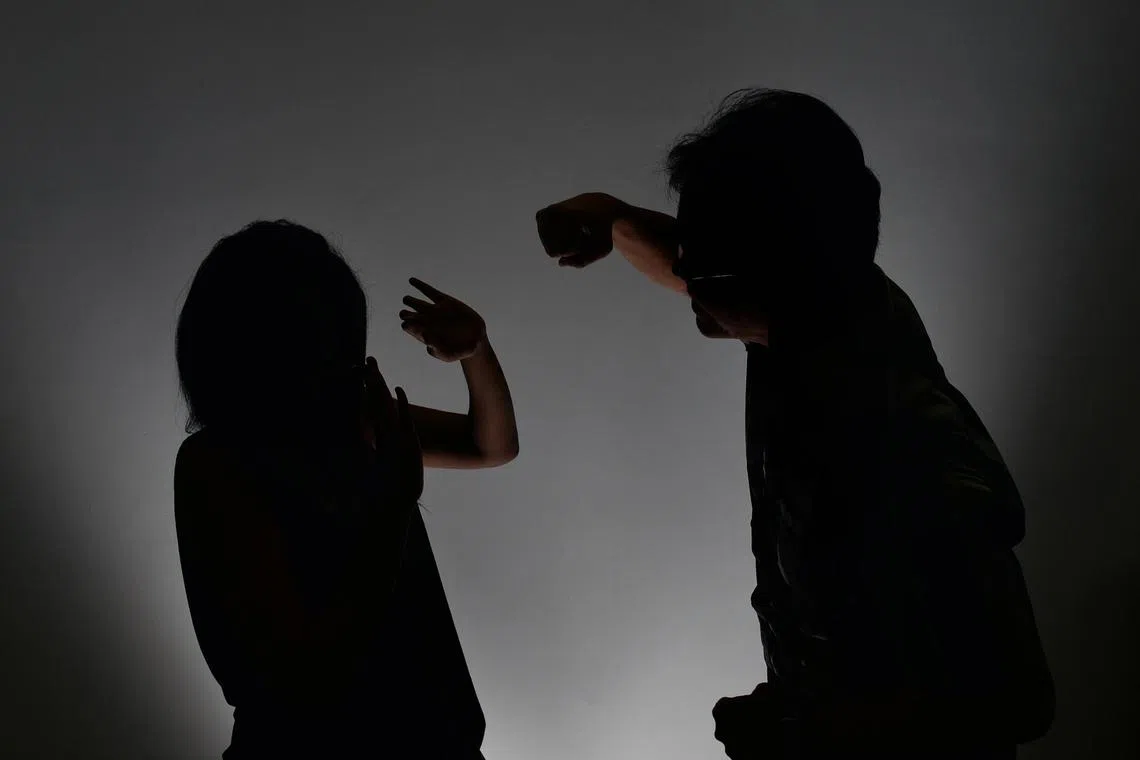Proposed changes to boost protection for family violence victims, rehab for abusers
Sign up now: Get ST's newsletters delivered to your inbox

Currently, abusers with a protection order against them can still gain access victims outside their home.
PHOTO ILLUSTRATION: TNP FILE
Follow topic:
SINGAPORE – Victims of family violence will have better protection against their abusers if proposed changes to the law are passed under the Women’s Charter (Family Violence and Other Matters) Amendment Bill.
The Bill, which was introduced in Parliament on Tuesday, will add three new provisions to personal protection orders (PPO), which are court orders restraining a person from committing violence against a family member.
The stay-away provision will prevent the perpetrators from being outside the survivors’ home or places that they frequent, while the no-contact provision prevents them from visiting or communicating with the survivors.
Currently, abusers with a protection order against them can still gain access to victims outside their home, such as in public areas.
A mandatory treatment provision may be issued by the court, if the perpetrators are suffering from a psychiatric condition that contributes to their behaviour which warranted the protection order.
The Ministry of Social and Family Development (MSF) investigated 2,254 new family violence-related cases in 2022, and 2,346 cases in 2021. The National Anti-Violence and Sexual Harassment Helpline received 10,800 calls in 2022, up from 8,400 calls in 2021.
The Bill will also lower the minimum age to apply for a PPO to 18, from 21. Currently, those between the ages of 18 to 20 who are unmarried need to rely on others like their guardians to apply for a PPO on their behalf.
This amendment will allow younger survivors of abuse to seek protection and represent themselves in PPO proceedings.
The recommendations were first released in 2021 by the Taskforce on Family Violence,
MSF sought public feedback on the proposed amendments in April 2022, and received strong support for them.
The current definition of family violence, which some organisations such as gender advocacy group Aware have argued should be broadened, will also be updated with the Bill.
Currently, family violence is defined as causing hurt, placing a family member in fear of hurt and wrongfully confining a family member against his will.
The updated definition will include a wider range of violence, like sexual, emotional and psychological abuse. It also makes clear that abuse can be both a single instance or a course of behaviour.
The upcoming changes also include protecting survivors’ identities. Unless the director-general of social welfare’s approval and the survivor’s consent have been obtained, the Bill prohibits any publication or broadcast that identifies, or is likely to identify, the survivor.
For example, the court can order a social media post that identifies the survivor to be taken down.
Rehabilitation for perpetrators, as well as penalties for those who breach family violence-related court orders, will also be ramped up under the Bill.
The scope of counselling provisions will be expanded to include more programmes, treatments and interventions, like parenting programmes or caregiving training, to strengthen rehabilitation.
The court will also consider if counselling will help to rehabilitate the perpetrator, and reduce the risk of violence in their other or future relationships.
Currently, the court does not issue counselling in certain instances, such as if there is a low likelihood of future contact between the survivor and the perpetrator.
The rehabilitative provisions will continue even if the PPO or expedited order is varied, suspended or revoked subsequently, so that the needed interventions can be completed adequately.
The penalties for those who breach family violence-related protection orders will be made heavier. Those on a first conviction may be handed a fine of up to $10,000 and/or jail up to 12 months, up from the current penalty of up to $2,000 fine and/or jail up to six months.
In addition, to ensure that perpetrators take their rehabilitative provisions seriously, any breach of a counselling provision, assessment order for the purpose of mandatory treatment, and a mandatory treatment provision will be punishable with a fine not exceeding $2,000.


